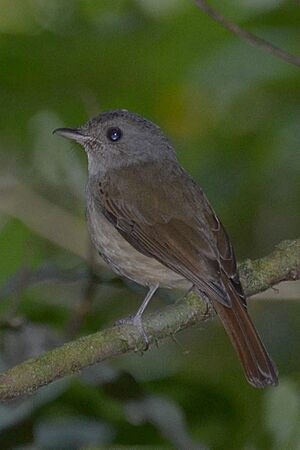Matinan blue flycatcher facts for kids
Quick facts for kids Matinan blue flycatcher |
|
|---|---|
 |
|
| Conservation status | |
| Scientific classification |
|
| Kingdom: | Animalia |
| Phylum: | Chordata |
| Class: | Aves |
| Order: | Passeriformes |
| Family: | Muscicapidae |
| Genus: | Eumyias |
| Species: |
E. sanfordi
|
| Binomial name | |
| Eumyias sanfordi (Stresemann, 1931)
|
|
| Script error: The function "autoWithCaption" does not exist. | |
Script error: No such module "Check for conflicting parameters".
The Matinan blue flycatcher is a small, colorful bird. It is also called the Matinan flycatcher. This bird belongs to the Muscicapidae family, which includes many flycatchers. You can only find this special bird on the island of Sulawesi in Indonesia. It lives in wet, cool mountain forests. Sadly, its home is shrinking because of habitat loss.
Contents
What Does the Matinan Blue Flycatcher Look Like?
The Matinan blue flycatcher is a small bird. It is about 14.5 cm (5.7 in) long when it is fully grown. This is about the length of a small pencil. It is a quiet bird that blends into its surroundings.
Colors and Features
Its head and upper body are greyish-brown. The top of its head is a bit greyer. The sides of its head and its wings are darker. Its lower back and tail have a greenish-brown color, like olives.
The bird's belly and chest are light brownish-grey. The area around its bottom is a yellowish-tan color. It has large, black eyes. Its beak is pinkish-tan and has a wide base. The tip of the beak is thin. Short bristles, like tiny hairs, grow around its beak.
How Does the Matinan Blue Flycatcher Behave?
The Matinan blue flycatcher often flies with other flycatchers. They form small groups in the lower part of the forest trees. Its actions are similar to another bird, the blue-fronted blue flycatcher.
Hunting for Food
This bird eats small insects. It catches them by watching carefully from a perch. It twists its head from side to side to spot its prey. Then, it swoops down quickly to grab the insect.
Nesting Habits
Scientists have seen these birds nesting in holes in dead trees. This happened in areas where the forest had been disturbed. This might mean the Matinan blue flycatcher can live even if some of its natural primary forest home is damaged.
Where Does the Matinan Blue Flycatcher Live?
The Matinan blue flycatcher lives in about four places. These are in the mountains of the Minahasa Peninsula in northern Sulawesi. One of these places is the Gunung Ambang Nature Reserve. Here, you can find them in both untouched and regrowing forests. They live at heights of about 1,400 metres (4,600 ft) above sea level.
Population and Threats
No one has counted all these birds exactly. But there might be between ten and twenty thousand of them. Their numbers are thought to be going down. The main reason is that their home is being destroyed. People are clearing the edges of the mountain forests for logging.
The IUCN (International Union for Conservation of Nature) lists this bird as being of least concern. This means it is not currently in danger of disappearing. However, its shrinking habitat is still a worry for its future.
 | Isaac Myers |
 | D. Hamilton Jackson |
 | A. Philip Randolph |


